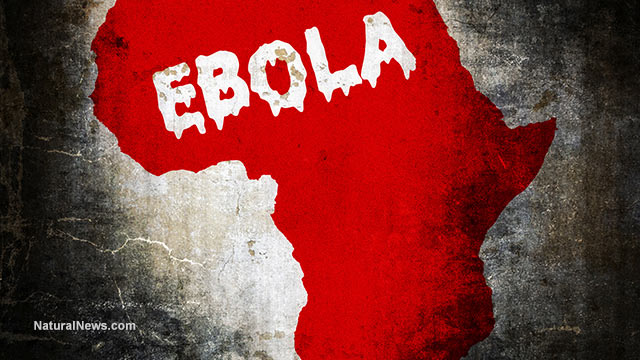Ebola accelerates in Sierra Leone with 900% higher transmission rate
Thursday, November 06, 2014 by: Jonathan Benson, staff writer
Tags: Ebola, transmission rate, Sierra Leone

- Newly released JFK files reveal Pentagon's role in creating Lyme disease and covid in the same lab
- Discovery of vast underground city beneath Giza pyramids challenges human history
- Black cumin seed oil emerges as a powerful ally against breast cancer and chronic inflammation
- Sugar-free deception: Artificial sweeteners hijack hunger signals, fuel obesity epidemic, study warns
- Kiss Your Genetic Privacy Good-Bye! 23andMe Gets Green Light to Sell Your Intimate Genetic Details to Anyone They Want
- Aluminum pollution: A silent threat to human health
- Dr. Suzanne Humphries makes bombshell appearance on Joe Rogan podcast, exposing vaccine industry deception back to POLIOMYELITIS
- The mighty Eggplant: An underrated superfood with ancient roots
- Is the vaccine-autism debate reopening? Washington Post sparks controversy with preemptive hit piece on David Geier
- Sweden's migrant crisis deepens as failed green energy venture leaves thousands jobless, exposes systemic collapse
- A handful of pecans a day could keep heart disease at bay, study finds
- Analysis: The coming economic collapse, a mass uprising and Trump's three secret weapons to halt the growing revolt
- The great crypto power struggle: How technocrats and governments are reshaping global finance
- RFK Jr. slashes HHS bureaucracy, saves taxpayers $1.8B while refocusing on chronic disease epidemic
- AI breakthrough slashes celiac disease diagnosis time from months to minutes
- Challenging the status quo: “America Fooled” by Timothy Scott exposes the myths about antidepressants
- HIGH-FAT FOOD DEPRESSION: Scientists discover why obesity takes away the pleasure of eating
- Understanding the difference: “Food Allergies and Food Intolerance” by Dr. Jonathan Brostoff and Linda Gamlin
- Newly released JFK files reveal Pentagon's role in creating Lyme disease and covid in the same lab
- Analysis: The coming economic collapse, a mass uprising and Trump's three secret weapons to halt the growing revolt
- Trump nominates VACCINE ZEALOT Susan Monarez to lead the CDC, sidelining RFK Jr.'s reform efforts
- Trump's greatest betrayal so far: Accelerating Middle East wars, silencing dissent, and serving Zionist masters
- Dr. Mike Yeadon releases 15-minute testimony - WATCH - about genocidal intent of COVID “vaccines”
- Festive flavors: The sweet history, nutritional profile and health benefits of pecan pie
- Elon Musk: Aliens could be here on Earth RIGHT NOW
- Big Pharma's $8 Billion bribery scheme exposed: how doctors are pushed to prescribe junk science, not heal
- 5 Simple steps to boost your brainpower: How to strengthen executive function in a distracted world
- Trump reverses course on Gaza plan, says “nobody is expelling Palestinians”
- A lack of integrity in Academia: Harvard professor found GUILTY of fraudulent research to promote CRT theory
- Reclaim your health: How midlife exercise reverses years of inactivity
- Survival 101: Effective EMF blocking techniques
- Florida takes a stand: DeSantis proposes permanent ban on mRNA vaccine mandates
- Sugarcane extract superior to cholesterol-lowering drugs?
- California's social media censorship law struck down: A victory for free speech or a threat to online safety?
- OpenAI whistleblower who dissented against how the company trained ChatGPT found dead
- EPA advisor admits the agency is funneling billions to climate groups ahead of Trump’s return to White House
- EPA advisor admits the agency is funneling billions to climate groups ahead of Trump’s return to White House
- Newly released JFK files reveal Pentagon's role in creating Lyme disease and covid in the same lab
- California's social media censorship law struck down: A victory for free speech or a threat to online safety?
- Dr. Mike Yeadon releases 15-minute testimony - WATCH - about genocidal intent of COVID “vaccines”
- The Health Ranger releases “Vaccine Zombie” song and music video, using AI-animated zombies for the music video
- The pandemic as a tool for INDOCTRINATION: Understanding “The Indoctrinated Brain” by Dr. Michael Nehls
- Florida takes a stand: DeSantis proposes permanent ban on mRNA vaccine mandates
- “Why we influenced the 2020 elections”: Facebook files reveal the coordinated effort to bury the Hunter Biden laptop story
- Mike Adams releases country western hit single: Goin’ Back in Time is Comin’ Home
- Mike Adams releases music poetry sensation: A Child of God
- Unpacking the Lies That We’ve Been Fed – new song and music video released by Mike Adams, the Health Ranger
- Michigan sheriff announces criminal investigation into 2020 election crimes, Dominion Voting Systems
- Migrants are taking advantage of recent hurricanes to scam residents and loot their homes
- House Intelligence Committee calls for the ARREST and PROSECUTION of Dr. Anthony Fauci
- RFK Jr. clears key hurdle: Sen. Susan Collins backs controversial HHS nominee, signaling a new era for health policy
- Rep. Nancy Mace introduces bill to ban biological males from female facilities on federal property
- Peter Rost exposes Big Pharma corruption in his book “The Whistleblower: Confessions of a Healthcare Hitman”
- Mike Adams releases new song and music video: Nothing More Disgusting Than a Globalist
- Red Cross issues warning to stop blood plasma donations from vaccinated people
- Scientists confirm: GENIUS brain function can be spontaneously unleashed in humans without any apparent cause
- EPA advisor admits the agency is funneling billions to climate groups ahead of Trump’s return to White House
- HYSSOP: What research reveals about the health benefits of this ancient holy herb
- Two containers with completed ballots fall out of truck in Florida
- Fully vaccinated about to see “tsunami” of illness and death, warns virologist
- Global leaders unite to clamp down on “misinformation” with UN-backed Cascais Declaration
- BREAKING: 2025 NDAA authorizes mandatory military draft of WOMEN across America… as Pentagon pursues global NUCLEAR war with both Russia and China at the same time
- Michael Yon warns of a ZIONIST TAKEOVER in Trump’s second administration
- BOMBSHELL: DNA testing kits are a SCAM to develop ethnic-specific bioweapons
- Ozempic and Wegovy weight loss drugs are injectable LIZARD VENOM PEPTIDES that may unleash a devastating wave of organ failure… side effects align with symptoms of SNAKE BITES
- Israeli soldiers accused of even more torture and abuse in the West Bank
- These 13 countries just signed an agreement to engineer a global FAMINE by destroying food supply
- NASA admits that climate change occurs because of changes in Earth’s solar orbit, and NOT because of SUVs and fossil fuels
- RFK Jr. clears key hurdle: Sen. Susan Collins backs controversial HHS nominee, signaling a new era for health policy
- Sermon 30: How Jesus reveals Caesar’s FAKE CURRENCY and FALSE AUTHORITY
- Coriander seeds: Ancient medicine backed by modern science
- Arizona officials claim Maricopa County needs 10-13 days to tabulate results of the election
In early September, the official number was 1.3 new cases of Ebola per day in Sierra Leone, one of the three "ground zero" countries that has been most ravaged by the virus. Now, that number has escalated to 12 new cases per day in the rural areas surrounding Freetown, the country's capital, representing a more than nine-fold increase.
The data was compiled by Sierra Leone's health ministry and relayed to AGI analysts, who used it to come up with three-day averages for how quickly the disease is spreading. This same data showed that, in the city of Freetown, Ebola is spreading at a rate about six times higher than it was two months ago, suggesting that the crisis is far from over.
"The government of Sierra Leone is making real strides in tackling transmission by speeding up access to treatment and safe and dignified burial," stated AGI chief executive Nick Thompson. "But we can't rest until Ebola has nowhere to hide. And we can see from growth in new cases in some rural parts of Sierra Leone that we still have no time to lose if we're going to get on top of this."
Ebola fears being stoked to continue military invasion of West Africa
These statements by Thompson take on a whole new meaning when you consider that the U.S. government and others are sending troops to West Africa supposedly to help contain the virus, when in fact they know little or nothing about it. If anything, sending our military men and women to the region only puts them, and ultimately the rest of the country, at risk of contracting Ebola.As explained by Global Research, the roughly 2,000 National Guard troops that Obama recently sent to Africa have not been properly trained in dealing with this type of health crisis. But they are there to set up dozens of supposed treatment centers, which some believe is more indicative of the true purpose of the crisis: to advance the U.S. military's presence throughout the region.
"The total collapse of the public health systems throughout Africa follows decades of civil wars, fomented by US and EU military policies, in order to plunder Africa's economies and rich natural resources -- while marketing Western arms and mercenaries," wrote Professor James Petras for Global Research.
"Militarizing the problems of Africa and creating millions of refugees has naturally led to plagues -- Ebola today, [malaria yesterday] and other infectious diseases and miseries tomorrow."
According to the World Health Organization (WHO), an estimated 5,000 people have died of Ebola so far in West Africa. The United Nations arm says there have been roughly 13,500 documented cases of the disease since the outbreak began, but the true number of victims could be much higher.
"And we can see from growth in new cases in some rural parts of Sierra
Leone that we still have no time to lose if we're going to get on top of
this," added Thompson, pushing the agenda of more intervention from foreign governments.
Learn all these details and more at the FREE online Pandemic Preparedness course at www.BioDefense.com
Sources:
http://news.yahoo.com
http://www.rte.ie
http://www.globalresearch.ca
http://www.aljazeera.com
http://www.globalresearch.ca
http://science.naturalnews.com
Ebola at FETCH.news
Get independent news alerts on natural cures, food lab tests, cannabis medicine, science, robotics, drones, privacy and more.
More news on Ebola
Take Action: Support Natural News by linking to this article from your website
Permalink to this article:
Embed article link: (copy HTML code below):
Reprinting this article:
Non-commercial use OK, cite NaturalNews.com with clickable link.
Follow Natural News on Facebook, Twitter, Google Plus, and Pinterest
Science News & Studies
Medicine News and Information
Food News & Studies
Health News & Studies
Herbs News & Information
Pollution News & Studies
Cancer News & Studies
Climate News & Studies
Survival News & Information
Gear News & Information
News covering technology, stocks, hackers, and more



"Big Tech and mainstream media are constantly trying to silence the independent voices that dare to bring you the truth about toxic food ingredients, dangerous medications and the failed, fraudulent science of the profit-driven medical establishment.
Email is one of the best ways to make sure you stay informed, without the censorship of the tech giants (Google, Apple, Facebook, Twitter, YouTube, etc.). Stay informed and you'll even likely learn information that may help save your own life."
–The Health Ranger, Mike Adams













































